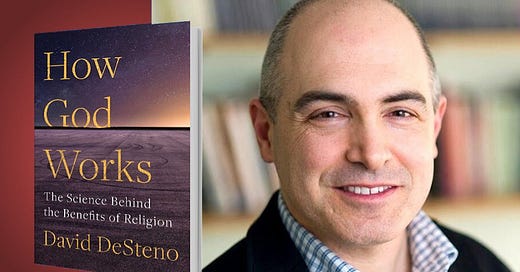I have to start by reflecting on the kindness of strangers. I’d never met David Desteno until he invited me to be a panelist at a live taping of his podcast in NYC. The experience, event and conversation were so great that I stayed in touch with David after that, and at some point, mentioned to him that I was interested in starting a podcast of my own.
He was so encouraging, and more than that, he helped connect me to people he knew in the field and reviewed early drafts and proposals that outlined my vision for this show. David’s generosity and active support laid the groundwork for this show.
Without him, this show, Wisdom & Practice, may never have come together.
I love talking to David and learning from him, in part because he challenges us to move beyond the cultural assumption that religion and science are mutually exclusive.
So many times, I’ve heard people say that we NEED to pick one or the other.
That they can’t co-exist.
But I don’t think that’s necessarily true.
I haven’t felt that scientific truth is at odds with existential truth. Science has deepened my faith and has helped me to better appreciate and understand our world. David’s research helps me in this journey.
And I love his gentle reminder. Maybe instead of getting stuck in cyclical debates about whether or not God exists, we learn from the scientific method and revisit our framing to ask a better question.
This episode is unlike our other episodes so far. We’re speaking with a scientist about their research and what they’ve uncovered.
I view this information as knowledge. But as we see through David’s reflections and stories, this knowledge can become wisdom if we take it into consideration and apply it to our lives.
This is what David means when he’s talking about thick practices, and how spirituality can lead to ethical living if we understand and leverage religious wisdom as a technology for self-transformation.
These practices, from mindfulness to expressions of gratitude, aren’t just nice ideas or philosophical aspirations; they are like little nudges that guide us toward kindness and connection in our daily lives.
And as David says, when we engage in these practices, we often see a shift in how we interact with the world.
Research shows that people who regularly embrace spiritual activities tend to be more compassionate and less reactive, ready to help others when the moment calls for it.
This challenges the outdated belief that morality is solely tied to religious affiliation. It’s not just about saying, “I believe”; it’s about diving into the practices that truly make a difference in how we treat ourselves and each other.
This isn’t just a label; it’s a way of living that fosters genuine community and purpose.
I’m pasting below an excerpt from our conversation. Click here to listen to the full episode on Wisdom & Practice.
Simran Jeet Singh: The reframe that I learned from you was what can science learn from religion? And it's not about how can religion prove science or how can science prove religion, but what can they learn from one another? And that's what I hear you describing now, and that's what I've heard you explore on your show. And I wonder, you know, for you, what does it look like to come to the table with that reorientation when culture and when everyone around us is constantly asking the other questions, right? Can religion prove science or can science prove religion?
David DeSteno: You know, initially, when I tell people kind of what I'm doing, they're looking at me kind of strange. But once we explain it, I think it resonates with people. You know, I'll give you an example.
One of the problems we have with our show is we call our show How God Works. And oftentimes, people assume it's going to be a proselytizing show, right? I'm here to kind of convince you, right, that you should believe in God. But once they hear what it's really about– which is how do we understand the way these practices make life better–I think there's an acceptance. What I'm trying to do is come with data and to show you, you know, we're a society that is full of people who want life hacks, right? Give me the life hack to help me study. Give me the life hack to help me lose weight.
If you look at these spiritual practices, you know, I always say life hacks are like playing single notes on a piano. These practices are like symphonies, that is, they incorporate elements that work on our minds and bodies in very sophisticated ways to help us build community, to help us shed anxiety and depression, to help us find compassion and meaning and joy.
And when I can show people that there is data, I think their eyes and minds open to it. And so I say, look, if you're a person of faith, then this is great because it's evidence to you that there is some wisdom here. If you're not a person of faith, you don't have to buy the theology, but there is something that's going on.
And I think once I can explain to people that my mission is not to prove God exists or God doesn't but to look at the wisdom behind the practices, there's an openness to it. And that's kind of the conversation that I'm trying to create.
Click here to listen to the full episode on Wisdom & Practice.




